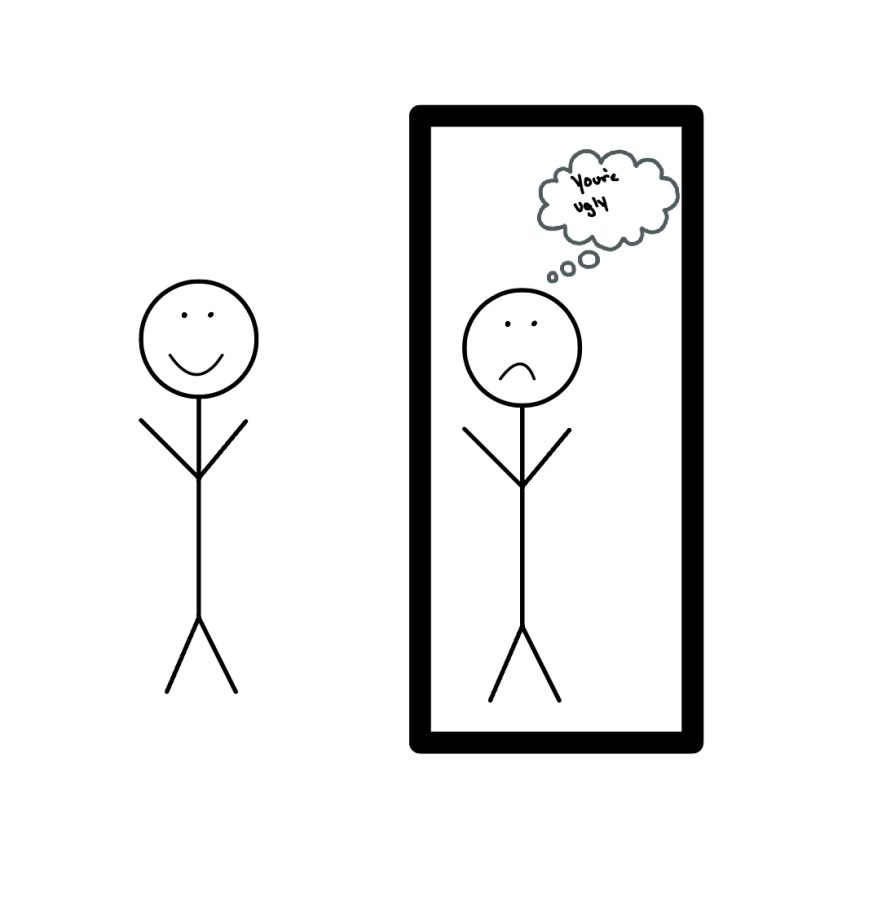The struggles of body image issues in teens
April 18, 2023
Teens are struggling with body image issues more than ever, and it’s most definitely taking a toll on how they perceive themselves. A survey conducted by the Norwin’s Knight Kier showed that 95% of teens have dealt with some sort of body image issues.
Whether it be through teens that are struggling with images of themselves, weight, physique, or skin insecurities, in some way a majority of students are being affected by these issues today. But, the remaining answer is why? Why are teens struggling with themselves so much? Maybe it’s the media, pushing out perfect images of people with the ideal beauty standard.
Teenagers today deal with issues about weight more than anything else, mainly having to do with having the ideal body that is seen in the media that seems unrealistic and unattainable.
According to Nemours Teen Health, “Weight, skin conditions like acne and hair were the most common causes of insecurities, yet fewer parents listed height and facial features. Nearly one in five parents of girls also said their child was self-conscious about their breasts.”
Students might not come to their parents about how they are feeling. Teens can be avoidant about the way they feel about themselves and others. Because of this, their parents might not know the extent of their body image issues.
Conducted in a recent Norwin Knight Krier poll asking questions about body image: students responded that 14 percent of teens said images of themselves affected their body image, 85 percent said weight, 20 percent said height, 45 percent said skin blemish’s, 25 percent said body hair, 70 percent said physique, and 5 percent said no insecurities about body image.
“Unhealthy skinny is known to be the only good look,” when asked what the ideal beauty standard is today junior Laci Kingerski said.
“It’s slowly evolving, with curvy and plus size models being more included,” junior student CJ Johnson said. “But some companies will hire thin models and put them in fat suits to model their plus size clothes. There is often a price bump from the “standard” and plus size clothes.”
One of the reasons teens today develop body insecurities is through social media. Social media can feed into the way teens view themselves. When scrolling on Instagram or Twitter, teens are constantly reminded about having the perfect body image. Whether it’s through seeing the perfect, tall, skinny model or seeing negative connotations about insecurities.
Jacqueline Sperling, PhD, a psychologist at McLean Hospital who works with youth who experience anxiety disorders, about Instagram’s recent restriction says: ‘Even if you remove the likes, there continue to be opportunities for comparisons and feedback. People still can compare themselves to others, and people still can post comments.’”
But why is the idea of having so many followers and likes appealing to this generation? Perhaps it’s due to the idea that teens grew up with technology surrounding them.
Growing up with the concept that fame was now so much more achievable as compared to before. Teens are intrigued by the idea of becoming famous for simply being “pretty.”
Not only does social media have a major impact on how teens perceive themselves, their parents and peers have even more of an influence than social media.
“It is so important to set aside time to self-reflect and care for yourself,” said Norwin Guidance first year counselor, Devon Fiore. “This may mean doing something fun, journaling, taking a walk, or talking to a friend. Also, when times get challenging, it is important to have someone to talk to, whether it be a family member or counselor. Seeking help when it is needed is courageous and beneficial.”
Surrounding yourself with people who bring out the best in you and bring you happiness is one of the best things you can do to improve your mental health and well being.
Teens’ ideas and images of their own body image needs to start changing more in the near future to improve teens mental health. If struggling with images of your body or mental health issues, seek out to a trusted adult or counselor for more help and guidance.



